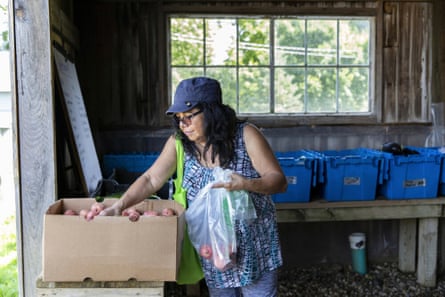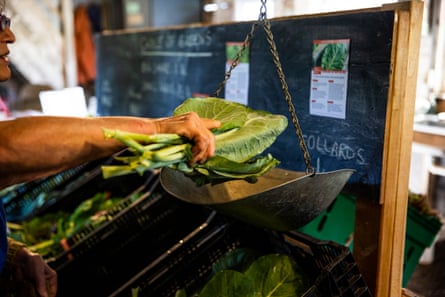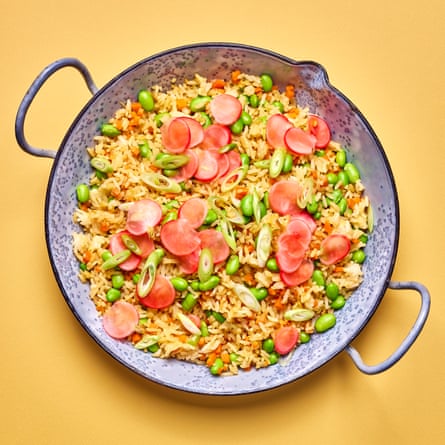Epretty Wednesday in the course of the developing year, Emilyn Sosa picks up a box of produce from a local community centre in Brooklyn crammed with the week’s harvest. This might include things like carrots, beets or sometimes kohlrabi, which she cooks up into soups and salads for her family members of five.
The price tag? It’s no matter what Sosa judges to be fair. For a weekly box, the 33-year-previous pays about $15 (£12). If she ended up to purchase a identical amount of money of fruit and veggies at a normal grocery store – where by the rates are of program non-negotiable – the expense may be upward of $60 (£50) for each 7 days.
Sosa is a member of a community-supported agriculture (CSA) application named Rock Regular, a 12-acre farm in upstate New York. Customers like her make common payments to obtain bundles of freshly harvested fruit and veggies. But the costs are decided on a sliding scale of earnings, allowing for clients to choose a payment level that is cost-effective to them. Other sector farms throughout the US are opting for sliding-scale designs in an hard work to achieve a broader demographic of prospects and to assist farmers remain afloat.
Sosa has no strategy what her fellow users are electing to pay out. “And that would make these a distinction, to not feel like a charity,” she explained.
At Rock Steady, the once-a-year selling price for associates, based on their profits, is break up into substantial ($1,155), middle ($825) and decrease ($660) brackets. In the reduce bracket, that will come out to about $30 (£25) a 7 days, for about eight or 9 merchandise. The farm also accepts Snap and EBT playing cards, the federal nourishment application formerly acknowledged as foodstuff stamps. Most folks are in the middle bracket, even though greater-cash flow contributors subsidize individuals on the lessen conclude of the scale.
When signing up for the system, customers are questioned to just take an inventory of their circumstance, both of those product and social, to figure out how substantially to fork out: do you very own a property? Do you have a university training? Do you have price savings? Those who do are asked to pay a increased share. People who have considerable financial debt or are renting or are senior citizens are invited to spend a decreased share.

A 2017 analyze of almost 500 CSA farm managers throughout the US located that 14% made available sponsored plans. A far more current review identified additional than 100 sponsored CSA packages.
While Rock Constant introduced a subsidized product in 2015, the Covid pandemic was a turning place, says co-founder Maggie Cheney, who employs they/them pronouns. It was at the commencing of the pandemic, when lines for food stuff pantries and grocery suppliers snaked all over New York Town blocks, that bigger-profits members of the CSA commenced offering extra so that those people with fewer signifies could pay for it way too, Cheney claimed. Now the farm’s CSA is so oversubscribed it has a 200-sturdy waiting record.
“It’s not a donation of our create, which is not a sustainable route for farmers, who generally can not even pay out themselves,” says Cheney.
“As a queer-owned and -operated farm, social justice runs deep in our mission,” they insert. “What motivates us is feeding our group, which is made up of several low-revenue and marginalized individuals.”
Also in New York state, but on the other facet of the Hudson River, a CSA farm referred to as the Phillies Bridge Job gives a national wage calculator to tutorial users to assistance them make a decision where they sit on the sliding scale. Some shares are discounted by 70% for these who are qualified for Snap, which arrives out to about $6 a 7 days for a smaller allowance of seasonal produce.
Assistant farm manager Rhyston Mays, who takes advantage of they/them pronouns, believes it is important to pay back a little something, even a marginal quantity. “Part of our honor technique is creating a framework for people today to be ready to self-find and have company as a person who participates in the food stuff procedure,” they say.
A review of 41 CSAs in California found that even when spending entire cost, reduced-money subscribers have been often extra committed to the method than those with larger incomes. People with annual earnings less than $50,000 (£41,371) were being additional determined to share monetary risk, volunteer and take part in farm events than those people with increased incomes.

Subsidizing make is however only a person alternative to the challenge of decreasing food stuff inequalities, says Matt Kauffman, the founder of 5 Loaves, an urban farm in Buffalo that features sliding-scale shares. “Just producing broccoli available doesn’t mean persons are going to try to eat broccoli,” he suggests. “There are cultural disconnects at participate in.”
This is a person of the negatives that Marilyn Sitaker, an epidemiologist and public well being researcher, has discovered with sliding-scale styles. “Food accessibility goes much outside of affordability,” she claims. Develop requires to be plentiful, uncomplicated to choose up, culturally ideal and suited to the customer’s preferences. “The CSA model involves willingness to make a determination. It’s not for everybody,” she adds.
For this purpose, 5 Loaves runs education packages, this sort of as cooking courses and agricultural internships, to give communities the instruments to get pleasure from refreshing produce. In Buffalo, a town with a diverse refugee and immigrant community, “maybe folks want these specific eggplants from Thailand or crops from east Africa,” Kaufmann states. As the Buffalo farm grows, it is starting to sow seeds from its members’ cultures.
Communities can be knitted alongside one another by “investing in the danger or reward of neighborhood agriculture”, states Colleen Dixon, a director at Zenger Farm in Portland, Oregon, which offers sliding-scale payments and operates a lot more like a farmers’ market. Rather of dispatching bins of generate, the fruit and vegetables are laid out on prolonged tables each individual 7 days from which CSA customers are invited to select a set number of products.
But there are risks associated with CSAs, for illustration if a farm fails to generate sufficient crops. “Some weeks we have large harvests, but some others it’s hundreds of pounds of tomatoes and not considerably else,” Dixon claims. When this takes place, Zenger Farm offers refunds to decreased-profits subscribers so they can resource their staple meals somewhere else.
Serious temperature can also disrupt crops. “If we have a snowstorm, drought or fires, it genuinely shortens the increasing year, which impacts foods generation,” Dixon suggests. “I anticipate we’ll see a lot more of these difficulties with local climate transform.”
These CSA courses are much ahead of federal and state governments, Sitaker suggests. A nationwide food items approach to fund programs that will take out limitations to nearby foodstuff access is only launching following calendar year.
But Sitaker thinks sliding-scale products could have “a tiny but mighty” position to engage in in addressing foods inequities with higher governing administration financial investment.


